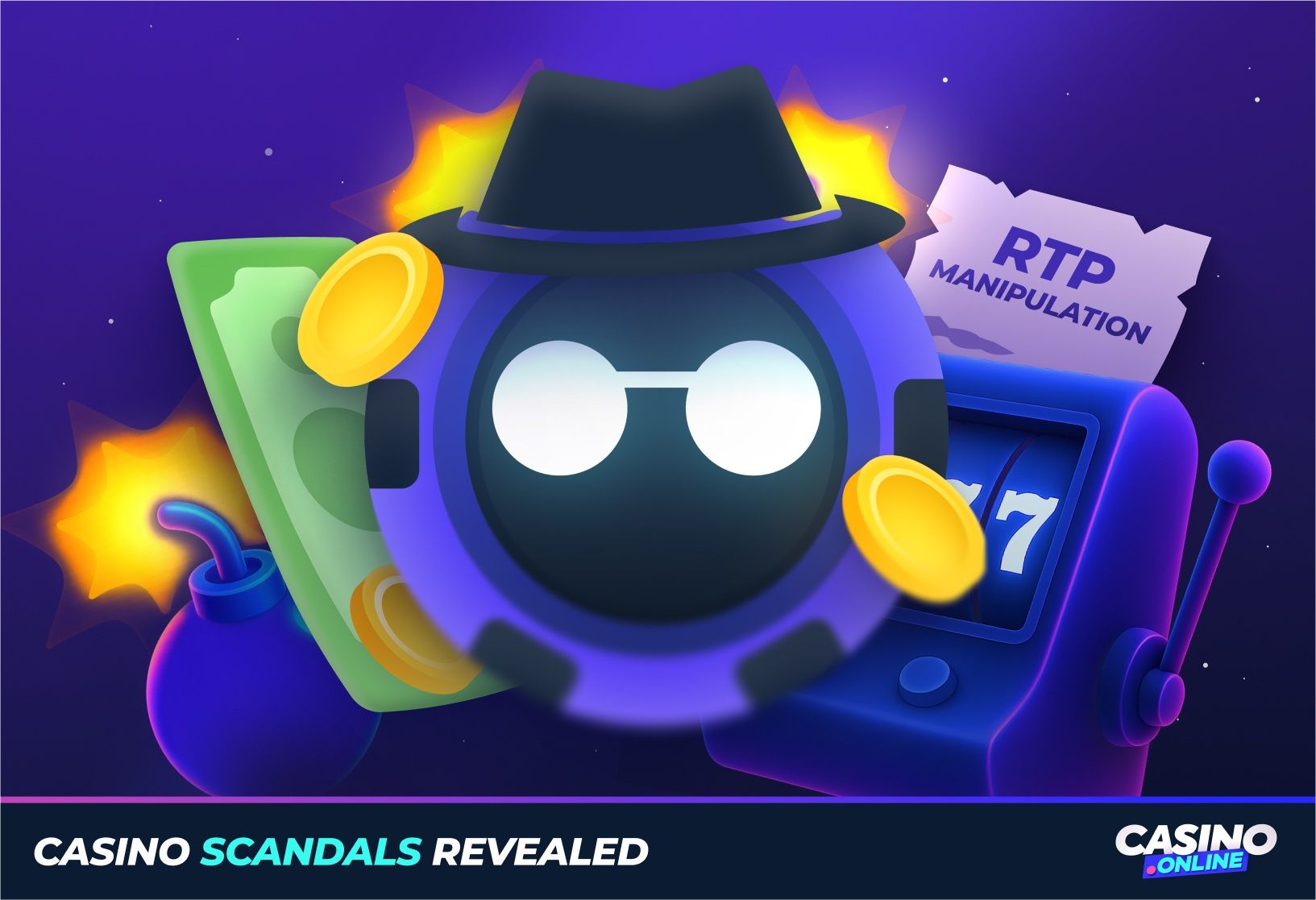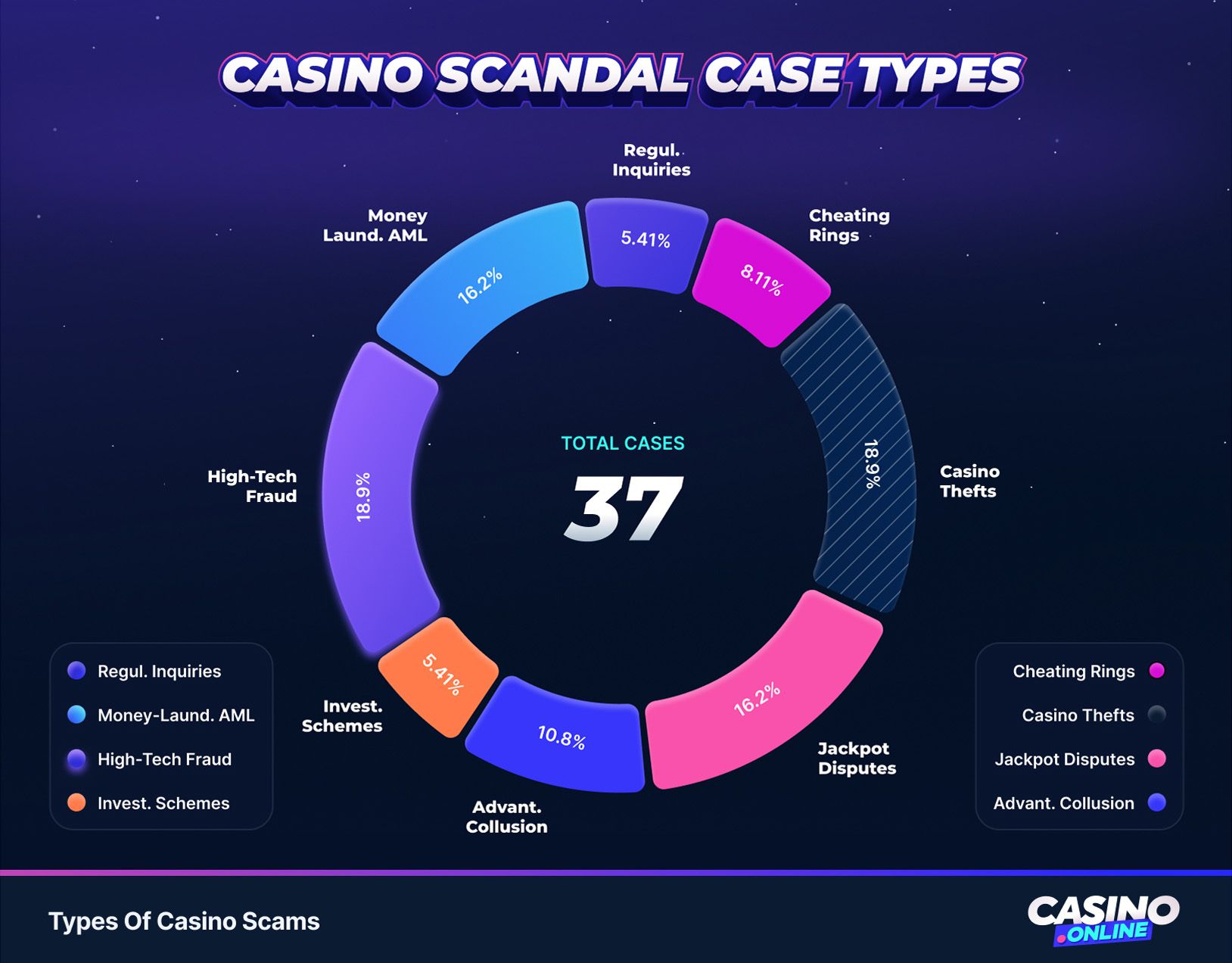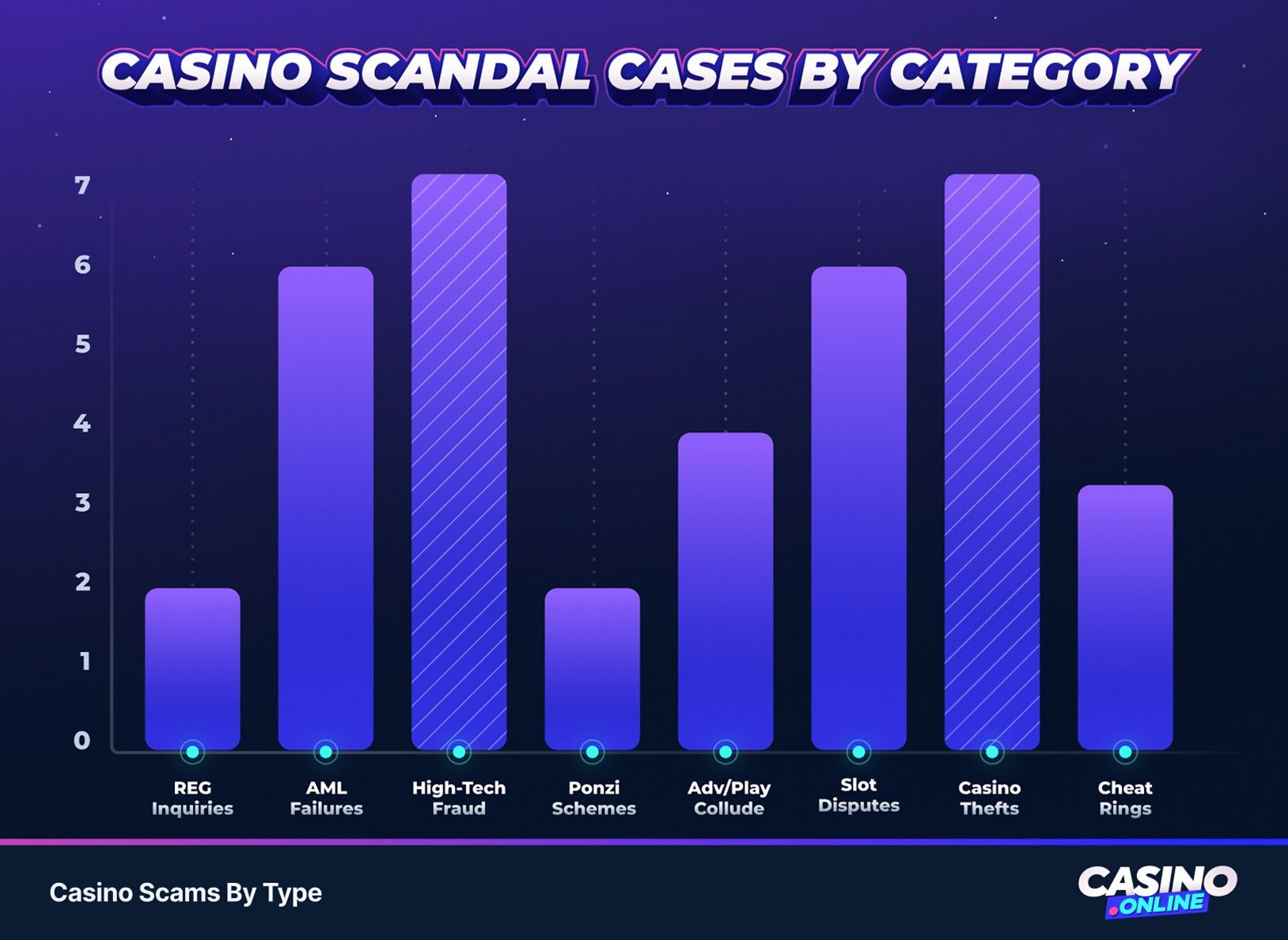
The Complete Casino Scandal Database (1990 - 2025): The Dirty Secrets Behind the Glitz
Article by
Updated by Jacob Evans Dec 19, 2025
From the smoky pit floors of Atlantic City to high-tech crypto dens in cyberspace, casino scandals have always haunted the gambling world, where big dreams often collide with bigger scams. Whether it's a crooked dealer sneaking chips into his socks, a blockchain token that vanished faster than your lunch money, or a slot machine that promised $166 million (yes, really), this database is your backstage pass to the biggest frauds, flops, and fiascos in the casino industry over the past 35 years.
If you've ever wondered just how far someone will go to beat the house, or how badly the house can screw things up itself, buckle up. It's a wild ride.

1. Regulatory Inquiries: When the Suits Step In
Government watchdogs don't mess around when they suspect casinos have gone rogue. Regulatory inquiries and royal commissions are serious business, formal investigations designed to uncover what's really going on behind the velvet ropes. These deep dives often reveal a tangled mess of money laundering, poor corporate governance, or just plain rule-breaking.
This section unpacks some of the biggest public reckonings from 1990 to 2025, showing how these scandals forced reforms, shuttered licenses,
Crown Resorts Royal Commission (Australia, 2021)
This wasn't just a slap on the wrist; it was a full-on public shaming. Crown Melbourne got grilled over letting criminal cash slosh through its VIP rooms. Ray Finkelstein's final report read like a corporate crime thriller. Instead of yanking the license, regulators went with "controlled rehab," appointing a special manager and making Crown clean up its act. Think of it like a casino going on probation.
The Sequel: Ongoing Oversight
New laws gave Victoria's gambling commission sharper teeth, up to AUD 100 million in fines if Crown backslides. As of 2024, they're still watching closely. The license is safe... for now.
2. Money Laundering: Where Dirty Money Comes to Shine
Casinos deal in cash, and lots of it. That makes them an attractive playground for money launderers looking to wash their ill-gotten gains. While Anti-Money Laundering (AML) laws exist to prevent abuse, enforcement isn't always airtight.
Here, we examine when and how major casinos dropped the ball on AML, the fallout that followed, and what it tells us about the critical need for robust compliance in the high-stakes gambling world.
Star Entertainment (Australia) 2017 -
Imagine running over AUD 125 billion through junkets with practically zero KYC controls. That's not just sloppy, it's begging for trouble. AUSTRAC responded with civil penalties and a potential AUD 400 million fine. The court's still chewing on this one.
Singapore's long game 2010 -
Since 2010, Singapore's been chipping away at laundering schemes like a casino version of "Whac-A-Mole." Nine convictions, SGD 6 million seized, and an ever-tightening net around suspicious transactions.
FBI's Skim & Swipe Crew (USA)
If Ocean's Eleven were about stolen debit cards and luxury mall splurges, this would be it. A multi-state ring laundered USD 6 million before the feds broke it up. Casinos from Vegas to Biloxi were used like glorified ATMs.
Wynn's repeat offenses 2018 -
Wynn Las Vegas holds the dubious title of "largest ever forfeiture", USD 130.1 million in 2018. Fast forward to 2024, and they're back in the hot seat for another USD 5.5 million fine. Apparently, old habits die hard.
UK and Europe: Hammer time
- William Hill got hit with a record £19.2M fine in 2023.
- Caesars UK? £13M.
- Bet365, Gamesys, Greentube? All coughed up millions for AML and social-responsibility slipups.
- And in 2025, RNG manipulation fines showed even back-end software vendors aren't safe anymore.
3. High-Tech Hustles & Insider Tricks
As casinos digitize, so do the crooks. Gone are the days of counting cards under your breath. Today's cheats might code software backdoors, plant RFID devices, or sync up in cybercrime rings. Meanwhile, insiders, dealers, coders, or execs- sometimes flip and help from the inside.
This section dives into digital-era scams and insider betrayals, with a focus on why casinos must constantly evolve their defenses and culture to stay one step ahead.
Ronald Dale Harris slot-machine hacks (1993 - 1995)
A Nevada Gaming Control Board programmer, Ronald Dale Harris, exploited software access to trigger jackpots via precise coin sequences and developed tools to predict Keno draws. With accomplice Reid Errol McNeal, he stole thousands before a suspicious ticket redemption led to conviction and a seven-year sentence (two years served).
Garden City Casino skimming (1981 - 1987)
A Santa Clara County grand jury indicted 14 individuals for skimming profits via false tax filings, conspiracy, and perjury. Owners paid USD 5 million, 12 employees served house arrest or community service, and restitution totaled USD 2,171,882. The casino was forced to sell, and its former owners were barred from licensing.
European poker-table earpiece network (July 2024)
French police arrested two men in Enghien-les-Bains using hidden cameras and earpieces to relay real-time poker card data, stealing tens of thousands of euros nightly. Pre-trial detention continues as casinos implement device screening and AI-enhanced surveillance.
Casino du Lac-Leamy bank draft fraud (August 2018)
In Gatineau, QC, fictitious bank drafts totaling CAD 1 million bypassed verification at Casino du Lac-Leamy. Following tightened workflows and staff training by Loto-Québec, the Sûreté du Québec arrested a 52-year-old Ontarian suspect.
Tribal Casino cashier embezzlement (2008)
At Apache-operated Silver Buffalo Casino, cashier Kimberly Dawn Logsdon double-counted winning vouchers over 11 months, pocketing USD 174,472.56. She was convicted federally and received a 37-month prison sentence, two years of supervised release, and full restitution.
Online-Poker superuser cheating ("God Mode," 2007 - 2008)
Accounts such as "POTRIPPER" and "NioNio" on Ultimate Bet and Absolute Poker used unauthorized "God Mode" code to view opponents' hole cards, cheating players out of over USD 50 million. Absolute Poker was fined USD 500,000; Ultimate Bet paid USD 1.5 million and reimbursed USD 22 million. Leaked audio revealed insiders admitted to embezzling between USD 16 and 18 million.
Full Tilt Poker & "Black Friday" (2007 - 2011)
On April 15, 2011, on "Black Friday," the DOJ seized Full Tilt's domain, accusing it of operating a global Ponzi scheme that misused USD 440 million of player funds. An indictment charged 11 executives with UIGEA violations, bank fraud, and money laundering. PokerStars later acquired Full Tilt, forfeiting USD 547 million and repaying players; no executives served prison time.
4. Ponzi Schemes Disguised as Casino Projects
There's something about the casino business, bright lights, fast money, exotic destinations, that makes it the perfect backdrop for a scam. Toss in a slick website, some flashy crypto jargon, or a fake blueprint for a luxury resort, and investors start handing over cash faster than they'd feed it into a slot machine. These Ponzi schemes didn't just fool a few; some conned thousands. Here's a look at the boldest lies dressed up in casino sparkle.
The "Savitar Systems" Mirage (2017 - 2025)
Imagine being promised a stake in a high-end casino development in Mexico, only to find out it never existed. That's what happened to investors who poured $23 million into Savitar Systems. Behind the curtain? Just two men, Thomas Madden and Jeremy Grabow, spinning stories and recycling new money to keep earlier investors quiet. It was all smoke and mirrors. In 2025, the feds finally came knocking.
The BlockPlay Crypto Hustle (2024)
Here's a classic red flag: guaranteed 20% monthly returns on a crypto token tied to an "upcoming gaming platform." BlockPlay promised the moon - what investors got was a fast rug pull. The so-called casino never launched, and over $50 million disappeared overnight. By the time regulators froze what was left, the founders were long gone.
Mirror Trading International's Global Trap (2019 - 2021)
This one spread like wildfire online. MTI lured in over 100,000 people worldwide, pitching an AI-powered trading platform that supposedly invested in forex and crypto with guaranteed gains. They even dangled gambling tie-ins to make the pitch more glamorous. Spoiler: it was all nonsense. It collapsed in 2020, leaving investors with empty wallets and a hard lesson.
Rose Valley's Glittering Lie (India) (2010-2013
The Rose Valley Group promised everything - resorts, hotels, casino-style entertainment - and collected ₹15,000 crore (roughly $2 billion) from hopeful Indian investors. Turns out, most of those assets were smoke. The operation was one of the largest Ponzi schemes in India's history. Multiple arrests followed, but for many victims, the money's long gone.
Sunshine Empire's Lifestyle Fantasy (Singapore) (2008 -2009)
Sunshine Empire sold itself as a luxury brand for the ambitious, complete with entertainment investments and casino tie-ins. In reality, it was just a high-gloss Ponzi scheme. By the time authorities shut it down, S$189 million had vanished, and several execs were behind bars. It's a reminder that even polished scams can be pure fiction.
The iProsperity Casino Connection (Australia) (2020)
Michael Gu's iProsperity brand looked like a rock-solid real estate fund on paper. Behind the scenes, hundreds of millions flowed through casinos, including Crown and Star, in what investigators called a textbook Ponzi. It's a blurry line between laundering and high-stakes investing, and Gu's case shows how easy it is for one to masquerade as the other.
The TradeAI & Stakx Crypto Collapse (UK) (2041 -2024)
Slick branding, killer domain names, and promises of crypto-powered wealth, it was everything the online punter crowd wanted to hear. But TradeAI and Stakx were just hollow shells. £330 million vanished before British authorities stepped in. The alleged orchestrator, Peter McInnes, insists he was just a "consultant." Right.
The PACL Land Scheme (India) (1997 -2014)
This one's less casino, more casino-adjacent. PACL - aka Pearls Group - ran one of the biggest Ponzi rackets in India by selling investors on land deals that didn't exist. With over ₹48,000 crore ($6 billion) collected and little to show for it, the scheme collapsed under its own weight. It's a warning that not all scams wear sequins, some hide behind real estate brochures.
What these scams teach us
Whether it's crypto buzzwords or casino floor plans that never existed, Ponzi schemes prey on one thing: hope. They offer easy money in a world where the odds are always against you. And in the gambling industry, that illusion of luck makes it even easier to sell the con.

5. Advantage Play: When Smart People (Almost) Break the Game
Advantage play involves legal strategies used by players to gain a statistical edge over the casino, such as card counting. However, when these strategies cross into unethical territory, especially with the involvement of casino staff, they become a significant concern. Dealer collusion refers to scenarios where casino employees collaborate with players to manipulate game outcomes.
This section delves into cases where advantage play and dealer collusion have led to substantial financial losses and prompted changes in casino operations.
MIT Blackjack Team (1979 - 2000)
This wasn't cheating, it was just very smart card counting. They treated it like a science project, and casinos didn't know what hit them until they'd lost around USD 50 million. Eventually, they were banned from basically everywhere.
Richard Marcus's "Savannah" Move (1982 - 2007)
Cheat-turned-consultant Richard Marcus perfected a chip-hiding technique, concealing a high-value chip beneath a low-value one, to accrue USD 36.6 million from roulette and table games over 25 years. He celebrated wins flamboyantly to trigger camera reviews and distracted staff on losses. Marcus retired in 2007.
Don Johnson (2011)
This guy didn't cheat, he negotiated. Custom rebates, massive table limits, no deck shuffles... and then walked away with USD 15 million. He beat the house at its own game.
Phil Ivey & Edge Sorting (2012)
Identifying microscopic differences in card backs isn't easy, but it's lucrative. Ivey made nearly USD 10 million before courts ruled it as cheating. He lost the money but gained gambling legend status.
6. Slot Machine Disputes: Glitches, Ambiguities & Lawsuits
Slot machines flash promises of instant fortune, but when a machine hiccups, the fallout can get ugly, and the question is asked: Are the slots rigged? Disputes arise when winners are denied jackpots due to glitches, unclear terms, or alleged malfunctions.
We spotlight the most controversial payout battles, the legal chaos that ensued, and what these cases mean for consumer rights and gaming regulations.

Slots
Seminole Hard Rock's $166 Million "Win"(2009)
A guy named Bill Seebeck thought he hit the mother of all jackpots. The machine said $166 million. The casino said, "Nah, that's a glitch." They offered $99K. He lawyered up.
Bally's Atlantic City million-dollar malfunction (2025)
Roney Beal watched as over USD 1.2 million was dispensed on a Wheel of Fortune machine at Bally's. Security voided the win, citing a "reel tilt," offering USD 350 instead. Beal's attorney petitioned regulators to preserve the machine and footage for independent review.
Caesars Interactive "Capital Gains" online jackpot (2020)
Lisa Piluso claimed a USD 100,000 progressive jackpot on the "Capital Gains" slot supplied by AGS via Caesars Interactive New Jersey. AGS initially offered USD 280, then USD 1,000, blaming a "bug." Piluso sued in federal court; New Jersey regulators fined AGS USD 1,000 and opened an investigation after similar complaints.
Sandia Casino Mermaid machine error (2006)
Gambler Gary Hoffman believed he won USD 1.6 million on an electromechanical "Mystical Mermaid" machine at Sandia Casino. However, the top legal payout was USD 2,500. The win was voided as a software error, and courts dismissed his suit on tribal-sovereign immunity grounds.
Corrine Durber v. Paddy Power (2025)
Her iPad showed a £1M+ win. Paddy Power blamed a programming bug and tried to settle for peanuts. The judge sided with Durber and ordered the full payout. Sometimes, you really can believe your eyes.
Andrew Green v. Betfred (2018)
Same story: slot shows a life-changing win, casino says "Oops, that's not real." This time, the High Court disagreed. Green got his £1.7 million, plus interest.
7. Theft & Shenanigans at Physical Casinos
Behind all the glamor, casinos have to deal with very real security threats. Think heists, scammy dealers, and patrons stuffing chips into creative hiding spots. Some jobs are slick inside operations, others are clumsy and chaotic.
This section covers 35 years of brazen thefts, ridiculous disguises, and what casinos learned the hard way about protecting their turf.
JACK Cleveland Casino dealer theft (2024).
Dealer Jason Saliba stole chips from low-stakes poker pots on 14 occasions, netting under USD 1,000. A player's tip and surveillance led to his arrest; Saliba pleaded guilty, received fines, and was banned for life.
Genting Casino Cromwell Mint dealer chip theft (2023).
A dealer at Genting Casino Cromwell Mint in London used a concealed tube to pass stolen chips into his socks over several months. Security recovered over £17,000; he was fired, cautioned by police, and permanently banned.
Samuel Bob-Emmanuel's Grosvenor Casino fraud (2023)
A 22-year-old student memorized a supervisor's PIN at Grosvenor Casino Birmingham and transferred £24,000 from poker-room tills to his own account. TSB froze the transfer; Bob-Emmanuel received a 12-month community order, 150 hours of unpaid work, and rehabilitation days for fraud by false representation.
Bellagio heist (2014 - 2015)
Anthony Michael Carleo donned a motorcycle helmet and brandished a gun to seize USD 1.5 million in chips from Bellagio, fleeing on a motorcycle. In March 2015, Carleo was sentenced to 3 - 11 years, with credit for time served, and faced restitution proceedings.
Royal Yak casino fire (2025)
A short-circuit blaze razed Royal Yak Casino in Culiacán, Mexico. Welders' sparks ignited flames that 88 firefighters extinguished over two hours. Three were injured, and 415 employees and 232 visitors, including a nearby school, were evacuated. Authorities ruled out arson.
Resorts World Sentosa superglue theft (2023)
A trio in Singapore used superglue on their palms to lift SG$1,575 in chips from gaming tables. All were arrested; the ringleader received 10 months in jail, accomplices seven months, and fines for theft and accomplice liability.
High-Roller account theft at Hard Rock (2025)
Joseph George Rice attempted to cash out USD 100,000 stolen from a YouTuber's slot machine account at Seminole Hard Rock Hollywood. Tribal police arrested Rice on grand theft and identity theft charges following slot voucher and video surveillance analysis.
8. Global Scams That Spanned Borders
Some scams are too big for one country. From Eastern European switch teams to Southeast Asian baccarat syndicates, casino fraud has gone international. These rings communicate via code, move fast, and vanish just as quickly.
We break down the major cross-border busts and what it took to stop them, highlighting the growing need for global law enforcement cooperation.
Monte Carlo token-switching (2015)
Sajid Rashid, Qamar Hussain, and Zahidul Haque Khan exploited token-switching at Casino de Monte-Carlo's roulette wheels, netting €3.66 million over one year. They were sentenced to 10 - 30 months and ordered to repay €850,000; Rashid was banned for life from London casinos after multiple identity fraud convictions.

Read more about Casino de Monte-Carlo
Grosvenor London "Cool Bet" scam (2016)
Dealer Stuart Shipp signaled accomplice Charlie Bostridge with hair-tugs to place uncalled bets across three sessions, winning a combined £5,475. CCTV operators exposed the ruse; both admitted fraud and received suspended sentences, community service, and compensation orders.
Bellagio Craps "Hop-Bet" scheme (2012 - 2014)
Anthony Granito and Jeffrey Martin, aided by Bellagio dealers Mark Branco and James Cooper Jr., defied 452 billion-to-1 odds to win over USD 1 million on hop bets. A dealer reported irregular play, leading to arrests and federal charges.
The Myawaddy scam compounds (2020s)
In Myanmar's remote Myawaddy region, a vast criminal underworld flourished during the pandemic and political turmoil. These weren't typical criminal dens, many compounds masqueraded as legitimate tech companies or casinos, using flashy job ads to lure desperate workers from across Asia.
Once trapped behind barbed wire and armed guards, victims were forced to run "pig-butchering" scams, building fake online romances to drain victims' savings through cryptocurrency fraud. Protected by local militias like the Karen National Army, these operations generated billions in illicit profits.
The breakthrough came when Chinese actor Wang Xing vanished in Thailand and was traced to a Myawaddy scam compound. His high-profile disappearance sparked global outrage and unprecedented cooperation between Thailand, China, and Myanmar. Together, they launched raids, cut power supplies, and rescued thousands of trafficked workers.
But this criminal machine remains resilient. The networks adapt quickly, and new compounds emerge as fast as others are dismantled. Defeating this cross-border cybercrime empire demands sustained global coordination, vigilance, and unwavering determination.
9. New-Age Scams: Crypto, AI & Deepfakes
The 2020s ushered in a new wave of casino scams: blockchain laundering, AI-enhanced cheating, and deepfake ID fraud. While flashy tech helps casinos improve service and security, it also arms the bad guys with powerful tools.
This section explores how cybercriminals are evolving, how the industry is adapting, and why staying ahead of innovation is now part of casino risk management.
Crypto laundering
Blockchain's anonymity is catnip for bad actors. But now? Regulators are catching up. Subpoenas, chain analysis, and coordinated crackdowns are becoming the norm.
AI arms race
Casinos are now using AI to catch cheats before they even sit down. Face scans, behavior analytics, and pattern recognition are replacing old-school pit bosses.
Global rules coming soon
Think GDPR, but for gambling. From safer gambling tools to AML thresholds, jurisdictions are finally talking to each other.

10. The Legal Reboot
Every scandal leaves a mark - and usually, a new law. Over the decades, wave after wave of regulation has shaped how casinos operate, from mandatory transparency to automated smart contract enforcement.
This section walks through the legal evolution from 1990 to 2025, showing how courts and lawmakers are building a more transparent, tech-aware framework for global gambling.
- Smart Contracts could soon automate payouts, making the "glitch" excuse obsolete.
- Courts are leaning in favor of transparency: if your T&Cs aren't clear and fair, don't expect sympathy.
- Global regulators are slowly but surely building a digital rulebook for the future.
11. Final Thoughts: What Happens Next?
The truth? Scammers evolve faster than most regulations. For every AI cheat detector, there's a deepfake artist trying to bypass KYC. For every million-dollar AML fine, there's another crypto casino pushing the limits.
But here's the silver lining: the industry is learning. Whether it's installing better safeguards, embracing blockchain transparency, or partnering across borders, casinos are tightening up. Slowly. Unevenly. But surely.
As long as there's money on the table, the con artists will keep coming. It's up to the rest of us - regulators, developers, operators, and yes, analysts like yours truly - to stay one step ahead.
Frequently Asked Questions: Casino Scandals & Frauds
What are the most famous casino scandals since 1990?
Some of the most infamous scandals include the Crown Resorts money laundering inquiries in Australia, the Full Tilt Poker ("Black Friday") Ponzi scheme, the Ronald Dale Harris slot-machine hack, and the record-setting William Hill AML fine in the UK. These cases often led to major legal reforms and lasting industry changes.
How do casinos detect and prevent fraud?
Casinos use a mix of high-tech and human surveillance, such as cameras, RFID chips, AI-driven behavioral analytics, and strict anti-money laundering (AML) protocols. Staff are regularly trained to spot unusual betting patterns and insider collusion. Online casinos deploy cybersecurity measures and real-time monitoring to prevent digital scams.
What is money laundering in a casino context?
Money laundering is the process of disguising illegally obtained funds as legitimate winnings. Criminals may "wash" money by exchanging cash for chips, gambling, then cashing out. Modern casinos must comply with rigorous AML laws, submit suspicious activity reports, and verify customer identity (KYC) to combat this.
Can online casinos be victims or sources of fraud?
Yes. Online casinos are targeted by cybercriminals using methods such as software exploits, bonus abuse, and payment fraud. There have also been cases where rogue operators scammed players or laundered money. Players should choose licensed, regulated sites and be wary of offers that seem too good to be true.
What happens if a slot machine malfunctions and pays out a huge win?
Outcomes depend on the casino's terms, local laws, and regulatory oversight. Sometimes the casino will void the win if a software or hardware error can be proven; in other cases, especially with clear terms and fair process, courts have ordered casinos to pay out disputed jackpots.
Are advantage play tactics (like card counting) illegal?
Advantage play itself (e.g., card counting in blackjack) is not illegal, but casinos may ban players they suspect of using such strategies. If advantage play involves collusion with casino staff, the actions cross into cheating and can result in prosecution.
Were there any major global crime networks or cross-border scams involving casinos?
Yes. Notable cases include international roulette chip-switching syndicates in Europe, baccarat fraud rings in Southeast Asia, and cybercrime compounds in Myanmar's Myawaddy region. These networks often operate across borders and target vulnerable regulatory gaps.
How have casino regulations changed since the 1990s?
Casino regulations have become much stricter, with mandatory anti-money laundering checks, player protection rules, and in some jurisdictions, requirements for technology like AI-based surveillance and automated reporting. Major scandals have often been catalysts for new laws and oversight agencies.
References
UNITED STATES DISTRICT COURT DISTRICT OF NEW JERSEY. (March 13, 2015). MARINA DISTRICT DEVELOPMENT CO., LLC doing business as BORGATA HOTEL CASINO & SPA, Plaintiff, v. PHILLIP D. IVEY, JR., GEMACO INC., and CHENG YIN SUN, Defendants.. US Courts.
Wikipedia. United States v. Kane. Wikipedia.
United States Attorney Southern District of New York. (September 17, 2011). United States v. Full Tilt Poker, et al.. justice.gov.
Financial Crimes Enforcement Network (FinCEN). (March 6, 2015). FinCEN v. Trump Taj Mahal Casino Resort, Civil Money Penalty Order. Financial Crimes Enforcement Network (FinCEN).
ASX/MEDIA RELEASE. (October 25, 2021). Royal Commission into Crown Resorts Report. Aspect Huntley.
THE SUPREME COURT OF VICTORIA. (January 17, 2023). AUSTRAC v. The Star Entertainment Group, Amended Statement of Claim. assets.slatergordon.
Gambling Commission. (August 21, 2025). UKGC Sanction Notice: Greentube Alderney fined £1 million. Gambling Commission.
Gambling Commission. (March 28, 2023). William Hill Group businesses to pay record £19.2m for failures. Gambling Commission.
Associated Press. (September 11, 2025). Bellagio bandit gets 3 to 11 years for chip heist. Fox news.
Chris Gothner. (September 11, 2025). Mississippi man accused of stealing $100K from high-rolling YouTuber at Hard Rock. Local 10.
Lydia Lam. (May 2, 2023). Trio jailed for using super glue on their palms to steal casino chips. Channel News Asia.

Written by
Andrew Collins
Author
I've spent over nine years at four leading iGaming firms - and long before that, I was emptying slots and balancing takings since 1992. From diving deep into slots and unearthing hidden betting strategies, I deliver witty, actionable advice that even seasoned bettors appreciate. Ready to elevate your play with me and casino.online? Let's get started!

Facts checked by
Jacob Evans
Content Writer & Casino Specialist
I'm Jacob Evans, your go-to expert in online gambling. With a robust background in casino gaming and a knack for breaking down complex betting strategies, I'm here to guide you through online casinos, sharing tips to help novices and seasoned bettors excel.



